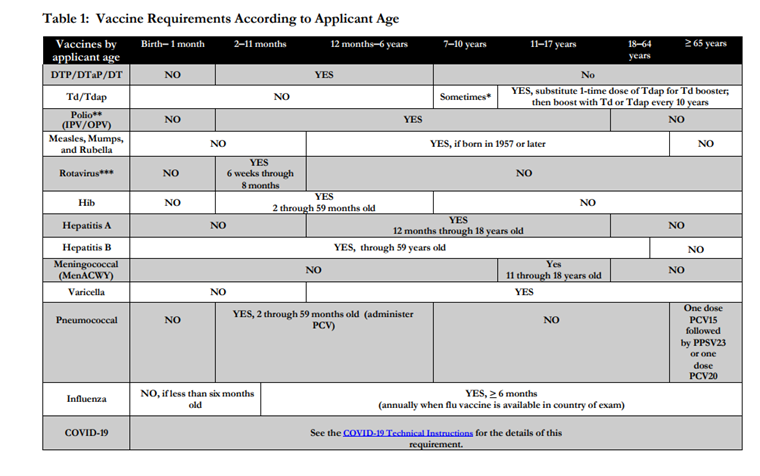Are My Medical Exams Correct?
As part of the Form I-485, Adjustment of Status application process, or the Immigrant Visa process if the Applicant is applying from abroad, USCIS requires that all Applicants be properly vaccinated and have a properly filled out Form I-693, Medical Examination form prepared by a USCIS authorized Civil Surgeon or Panel Physician and submitted to USCIS in a sealed envelope.
Unfortunately, many Applicants and immigration Practioners often run into situations where the authorized surgeon or physician has not properly completed the medical exam and it has led to detrimental consequences for their Adjustment process, including denial of their Form I-485 application or Immigrant Visa application.
First, the Civil Surgeon or Panel Physician should provide the Applicant with a copy of the medical examination results that are being sealed and provided to USCIS. This way the Applicant and/or their immigration attorney can view and check the results before sending the sealed envelope to USCIS. This will prevent erroneously completed medicals from being sent to USCIS and will reduce the chances that their Form I-485 is denied or otherwise negatively impacted by a deficient medical exam.
Second, the Applicant or their immigration attorney (if they have one), should review the copy of the medical exam they are given and make sure that they are completed in accordance with the USCIS and CDC vaccination requirements. These requirements can be found on the following websites:
https://www.uscis.gov/tools/designated-civil-surgeons/vaccination-requirements
https://www.cdc.gov/immigrantrefugeehealth/civil-surgeons/vaccinations.html
The Immigration and Nationality Act (INA)¹ specifies the following vaccinations must be administered or completed as part of the medical exam:
- Mumps, measles, rubella;
- Polio;
- Tetanus and diphtheria toxoids;²
- Pertussis;
- Haemophilius influenza type B; and
- Hepatitis B.
- CDC requires the following additional vaccines for immigration purposes:
- Varicella;
- Influenza;
- Pneumococcal pneumonia;
- Rotavirus;
- Hepatitis A;
- Meningococcal; and
- COVID-19.
If the applicant has not received any of the listed vaccinations and the vaccinations are age appropriate and medically appropriate, the applicant has a Class A condition and is inadmissible. Generally, all age-appropriate vaccine rows of the vaccination assessment must have at least one entry before the assessment can be considered to have been properly completed. However, the COVID-19 vaccination (required as of October 1, 2021) differs in that the applicant must complete the entire vaccine series (one or two doses depending on formulation).³
In order to determine which vaccines are “age appropriate” the Civil Surgeon or Panel Physician, should be referencing the vaccine requirements chart contained in the CDC Vaccination Technical Instructions. See this chart below⁴:

If you have questions about USCIS required medical examinations or if your Form
I-693 was properly completed, please contact our office for assistance today!
¹ See INA 212(a)(1)(A)(ii).
²
Applicants who have completed the initial DTP/DTaP/DT or Td/Tdap series should receive a Td/Tdap booster shot every 10 years. If the last dose was received more than 10 years ago, the applicant is required to have the booster shot, otherwise the applicant is inadmissible under INA 212(a)(1)(A)(ii).
³ For more information, including current dosage requirements for the immigration medical examination, see the CDC Requirements for Immigrant Medical Examinations: COVID-19 Technical Instructions for Civil Surgeons webpage.
⁴ https://www.cdc.gov/immigrantrefugeehealth/civil-surgeons/vaccinations.html
This blog is not intended to be legal advice and nothing here should be construed as establishing an attorney client relationship. Please schedule a consultation with an immigration attorney before acting on any information read here.






